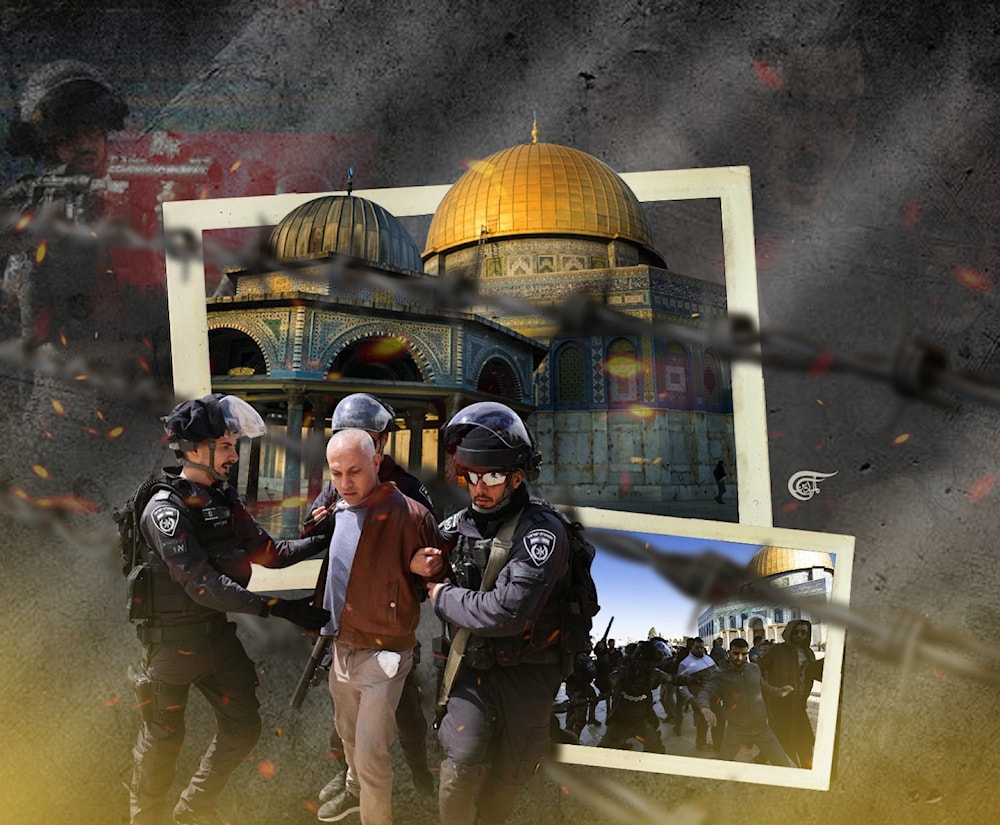Resistance and Resilience: The Palestinian Ramadan
An average Ramadan in Palestine consists of excitement, unity, spirit, and energy combined with beatings, arrests, clear provocations, and extra efforts by the Israeli occupation forces.
-

Ramadan for Palestinians is a snapshot of their lives (Illustrated by Zeinab el-Hajj; Al Mayadeen Ennglish)
Ramadan is a special time for all Muslims, but for Palestinians, it can be seen as a snapshot of their lives. An average Ramadan in Palestine consists of excitement, unity, spirit, and energy combined with beatings, arrests, clear provocations, and extra efforts by the Israeli occupation forces to humiliate them. This Ramadan, however, is slightly different.
The people are torn. On the one hand, their favorite time has arrived. In the days leading up to the start of Ramadan, the markets are usually bustling with people buying decorations for their homes, organizing their calendars full of invitations for Iftar, and looking forward to the long nights that become vibrant after the Isha (evening) prayers. On the other hand, they are heartbroken and nervous; heartbroken for their brothers and sisters in Gaza and for the unimaginable conditions they are being forced to endure, which only Allah, their oppressors, and themselves truly know of and nervous for what's going to happen this month. Most years, Israelis provoke the Palestinians during Ramadan, when it's easier for them to react as they are low on energy, dehydrated, and hungry, and most years their attention is directed at Al-Aqsa, one of the holiest sites in Islam.
"Going to Al-Aqsa is our duty, in Ramadan even more, and they know that. That's why, every year, you'll see videos of either soldiers or settlers storming the mosque, tear-gassing the worshippers, beating them, and detaining them. They want to disrespect us and incite us, but they know they can never stop us, though I'd be lying if I said I am not nervous this time around," explains Mais, a resident of occupied al-Quds.
"The last time I went to Al-Aqsa during Ramadan, the soldiers attacked us all. They refused to let us enter and then started hitting everyone with their batons. I got hit across my legs while trying to run away, and this memory still haunts me, but, of course, I will go again. I just pray things won't turn ugly."
In light of the war on Gaza, the writing is already on the wall, not just for al-Quds this time, but for all of the West Bank as well. The Israeli government already announced the restriction and banning of Palestinians from going to Al-Aqsa during Ramadan, and videos have been circulating of large cement barriers being driven into al-Khalil to restrict access to the Ibrahimi Mosque, the second most important mosque in Palestine.
"Just a few days ago, a large group of settlers were being escorted by just three soldiers and started cursing at us, telling us they're going to take over Al-Aqsa during Ramadan and make us pay. Of course, the Palestinians responded in kind with 'Ahlan wa Sahlan, we are waiting for you'. The situation is like a tinderbox, and Ramadan will be the fuse."
The consequences of Palestinians reacting to the extreme provocation can lead to devastating results. "They used to always act to taint our Ramadan before, and usually you could predict where it would happen and stay away from it if you chose, but there's been nothing predictable about their behavior since October 7," explains Duha, a lifelong resident of al-Khalil, West Bank's biggest city.
"For two months after the attack, soldiers would turn up on my street every night, from 10 pm onward, and stay until 7, 8, 9 am, causing carnage. They broke into every home on the street, hitting people, taking away men and women, and shooting at windows indiscriminately with bullets and tear gas. It was unbearable. Every night they would try and break my front door open, saying if we didn't open it, they would make us pay. It was terrifying."
"I lost my grandfather right after the war started, and none of us was allowed to move. We couldn't go to the hospital; we couldn't even go to his home afterward. They blocked all the exits, not just of the city but of my neighborhood. Anyone seen outside was an acceptable target for them, and that's within the city. Meanwhile, those trying to travel from one city to another had to deal with armed settlers roaming the streets shooting at any Palestinian car passing. They have the power to turn our lives on and off as they want and end it when they want. I lost a lot of people during that period."
"At times, they were ruthless animals, and at other times, they were like teenagers. They'd play loud, offensive music, insulting our prophets and religion. They would taunt us with what they are doing in Gaza, break every window of every car on the street, just because they could. But worst of all, they'd make Tiktok videos and dance right in the middle of the street I grew up on. All it takes is for one Palestinian to react to their incitement, and that nightmare will become a reality again. I pray for all of us that we can observe Ramadan in peace."
The suffering isn't just physical or psychological, but financial too. A successful Khalili businessman shares, "Ramadan is the best month for most of us. Everyone is out and spending and the people are in the mood to spend, buy, and celebrate, but now, they have neither the mood nor the money. They're suffocating us. Trade has stopped, so many of us who worked in Israel lost our jobs overnight, and we are suffering in this way as well. Gaza is dying through butchery; the West Bank is experiencing death by a thousand cuts."
Though everyone you speak to is worried, as always they are defiant until the end, with Dua summing it up best, "This year will be bad, but this isn't anything new for us. Our fathers suffered and so did their fathers before them. Now we suffer and tomorrow our children will, but Alhamdulillah, Allah has blessed us, He has written about us in the Qur'an and we leave our fate in His hands as always. Allah has never failed us, only humanity has."

 Imran Suleiman
Imran Suleiman
 6 Min Read
6 Min Read











